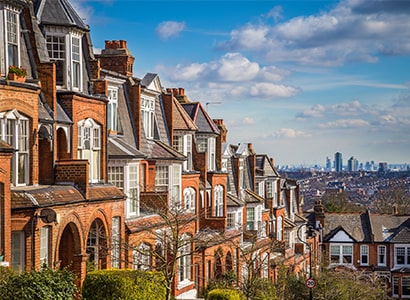- London rents fell significantly for the third consecutive quarter
- Q4 saw the biggest drop in London rents in 2020, down -8%
- Every London region was down year on year
- EC saw the biggest drop (-19%), followed by WC (-16%) and W (-12%)
- SE saw the smallest fall, down -3%
- Eight out of the ten postcodes where rents fell most sharply were in Zone 1
- 27% of London’s renters plan to move post-Covid-19, half of them intend to leave London altogether
- London is expected to experience a 13% net exodus in renters as a result
- Room rents across the rest of the UK rose by 2%
The new strain of Covid-19 has seen restrictions tighten once again, which has continued to have an effect on UK rents. Average room rents in London fell 8%, from £781 in Q4 2019 to £715 in Q4 2020, a clear sign that the capital’s rental market is struggling to recover from the pandemic.
This is the third consecutive quarter that London has seen a significant decline in average room rents, with rents down YOY throughout 2020. In Q4, every London region was down year on year (YOY). EC saw the biggest drop in rent (-19%), followed by WC (-16%) and W (-12%).
Eight out of the ten postcodes where rents fell most sharply were in Zone 1. Perhaps this comes as no surprise, as research by flatsharing site SpareRoom shows 27% of renters in London plan to move after the pandemic has come to an end, with half of them (49%) intending to leave the capital altogether. The upshot is a projected 13% net exodus of renters from London2.
The London postcodes where room rents have dropped most over the last 12 months are EC3* (Aldgate) -26%, SW1 (Westminster/Belgravia/Pimlico) -23%, EC2* (Bishopsgate/Cheapside) -21% and W8 (Holland Park) -20%, dropping from £1,154, £1,144, £1,061 and £1,113 to £885, £886, £839 and £894 respectively.
The cheapest areas to rent a room in London in Q4 2020 were SE2/Abbey Wood (£536), followed by E6/East Ham (£545) and N18/Upper Edmonton (£551). Interestingly, only 9 London postcodes across the capital saw an increase in rent YOY, all of which were outside of travel zones 1 & 2. SE20 (Penge) & N12 (North Finchley) experienced the biggest jump, both up 8%. Followed by E4 (Chingford), up 5%, and SE7 (Charlton), up 4%.
However, when it comes to the most popular London postcodes in the capital East London wins again – E1 (Shoreditch / Whitechapel), E14 (Canary Wharf / Docklands) and E2 (Bethnal Green) remained the most popular place to rent in London, based on number of room ads in each area.
The most expensive place to rent a room in the capital continued to be EC4*/St Paul’s with an average monthly rent of £1,262. Following this was SW7 (South Kensington / Knightsbridge) at £1,103 and SW3 (Chelsea) at £987.
Whilst the capital struggles to regain momentum, room rents around the rest of the UK were up 2%. In fact, out of the UK’s 50 largest towns and cities, just 12 saw a drop in rent YOY.
Following London, Birmingham and Edinburgh were the two cities that saw the biggest rent drops across the UK’s 50 largest towns and cities. Birmingham saw a drop of 6% (from £438 to £413) and Edinburgh was down 5% (from £581 to £550) in Q4 2020 compared to the previous year. Meanwhile, the fastest growing cities and towns in the UK were Sheffield and Northampton, both saw room rents increase by 4% YOY.
The data is the latest to be compiled as part of SpareRoom’s Quarterly Rental Index: a comprehensive overview of how the rental market is performing across the country, based on over 450,000 room listings.
Matt Hutchinson, SpareRoom Director comments: “London rents continue to fall and, as has been the case throughout the past year, it’s the expensive areas where they fall the fastest. We’re now seeing the biggest drop in London room rents since spring, and there’s no immediate sign of a recovery.
The first national lockdown made people think twice about living in cities, especially London. With another lockdown now underway it’s hard to see that changing any time soon. In the short term it means cheaper rents for those who stay in the capital, but longer term it’s going to be more about how quickly industries like entertainment, hospitality and tourism, which London relies so heavily on, recover from the pandemic.”

| [donate]
| Help keep news FREE for our readersSupporting your local community newspaper/online news outlet is crucial now more than ever. If you believe in independent journalism,then consider making a valuable contribution by making a one-time or monthly donation. We operate in rural areas where providing unbiased news can be challenging. |



















